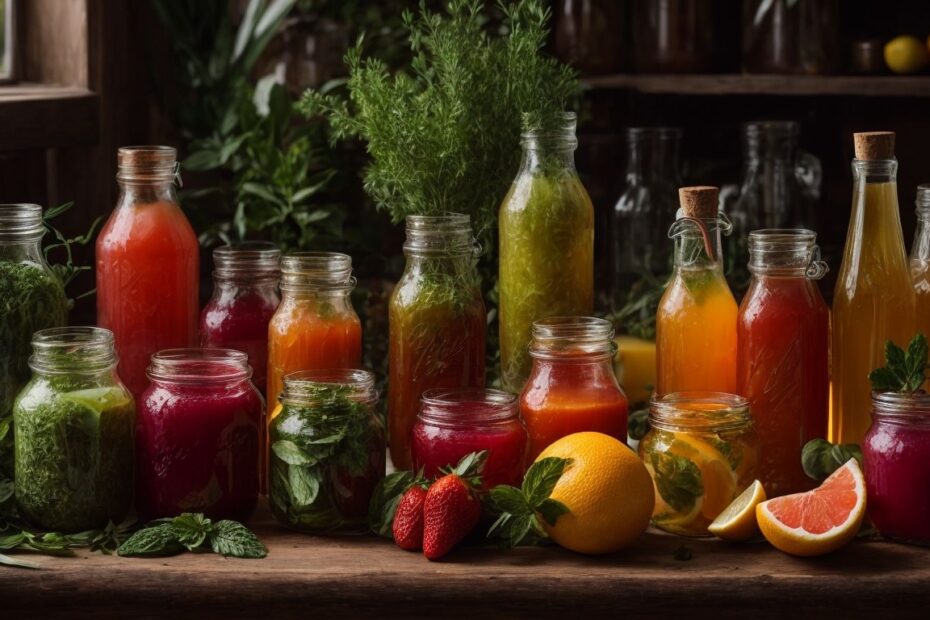Fermented drinks have been gaining popularity for their potential health benefits, particularly in promoting gut health. In this article, we will explore the world of the top fermented drinks, their benefits for gut health, and the different types you can try.
From the well-known kombucha to the lesser-known jun tea, we will delve into the unique characteristics and potential benefits of each. We will discuss the process of making your own fermented drinks at home, including the necessary ingredients, equipment, and steps involved. We will address any potential risks or side effects of consuming fermented drinks and provide precautions to ensure a safe and enjoyable experience.
Whether you’re new to fermented drinks or a seasoned enthusiast, this article will provide valuable insights and information to help you make informed decisions about incorporating these beverages into your lifestyle.
Key Takeaways:
- Fermented drinks are a type of beverage made through a natural process of fermentation, resulting in a probiotic-rich drink that can benefit gut health.
- Fermented drinks provide various health benefits, including improved digestion, a boosted immune system, and better nutrient absorption.
- Kombucha, kefir, kvass, jun tea, water kefir, ginger beer, apple cider vinegar drink, and lassi are some of the top fermented drinks worth trying for a healthier gut.
What Are Fermented Drinks?
Fermented drinks are beverages that undergo a natural fermentation process, resulting in the formation of beneficial probiotics and enzymes that support gut health and overall well-being. The process of fermentation involves the breakdown of sugars by bacteria and yeast, leading to the creation of probiotic-rich beverages.
This process usually takes place over several days to weeks, allowing the beneficial microorganisms to flourish and multiply, thus enhancing the nutritional value of the drink.
Common examples of fermented drinks include kombucha, kefir, and traditional homemade fermented fruit juices, each offering a distinct blend of probiotics and nutrients beneficial for gut health.
Why Are Fermented Drinks Good for Gut Health?
.jpg)
Fermented drinks are considered beneficial for gut health due to their rich probiotic content, which promotes the growth of a healthy gut microbiome and aids in digestion and nutrient absorption. The live cultures present in fermented drinks, such as kombucha and kefir, can contribute to the balance and diversity of the gut microbiota.
Probiotics, found abundantly in fermented drinks, play a crucial role in enhancing the gut environment. With their ability to restore and maintain the natural equilibrium of the gut flora, fermented drinks foster the synthesis of essential vitamins and offer immune system support.
Kombucha, a fermented tea, is known for its potential to improve gut health, while kefir, a fermented dairy product, can also contribute to the overall enhancement of the gut microbiome.
What Are the Benefits of Consuming Fermented Drinks?
Consuming fermented drinks, such as kombucha and kefir, offers a range of benefits for gut health, including improved digestion, enhanced nutrient absorption, and a balanced gut microbiome. The probiotics present in these beverages can also support immune function and overall well-being.
The consumption of fermented drinks has been linked to reduced inflammation in the gut, which can alleviate symptoms of digestive discomfort and improve overall digestive wellness. The live cultures present in kombucha and kefir assist in breaking down foods, aiding in the digestion process, and promoting a healthy gut environment. These drinks are rich in enzymes that help the body absorb essential nutrients effectively, contributing to overall health and well-being.
What Are the Different Types of Fermented Drinks?
A diverse array of fermented drinks exists, each offering unique flavors and health benefits. Some popular examples include kombucha, kefir, kvass, jun tea, water kefir, ginger beer, apple cider vinegar drink, and lassi, all of which contribute to a well-rounded selection of fermented beverages.
Each of these fermented drinks undergoes a natural fermentation process, resulting in a plethora of probiotics, enzymes, and beneficial acids.
Kombucha, for instance, is a tangy, effervescent drink made from fermented tea known for its potential gut health benefits.
On the other hand, kefir, a fermented milk drink, is rich in probiotics that may help improve digestion and support a healthy immune system.
1. Kombucha
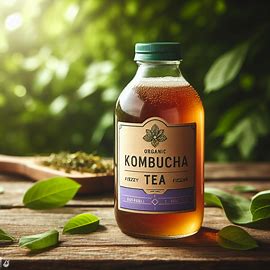
Kombucha is a fermented drink made from sweetened tea that undergoes a symbiotic culture of bacteria and yeast (SCOBY) fermentation process, resulting in a tangy, effervescent beverage rich in probiotics and antioxidants known for its potential benefits for gut health and overall well-being.
During the fermentation process, the SCOBY consumes the sugar in the tea and produces various beneficial acids, enzymes, and vitamins, contributing to its unique flavor profile and wellness properties. The resulting kombucha can have a slightly sour taste with hints of sweetness, depending on the length of fermentation. Flavors can range from fruity and floral to more intense and acidic, appealing to a wide array of palates.
Many enthusiasts cherish kombucha not only for its refreshing taste but also for its potential health advantages. It may support digestion, improve gut flora balance, and boost immune function, thanks to its probiotic content. The presence of antioxidants in kombucha provides additional wellness benefits, aiding in detoxification and promoting overall well-being.
2. Kefir
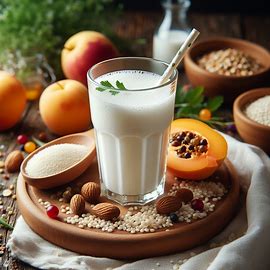
Kefir is a fermented dairy drink traditionally made from kefir grains, which contain a combination of lactic acid bacteria and yeast, including Lactobacilli species, contributing to its probiotic nature and potential positive impact on the gut microbiome and digestive health.
Kefir has a slightly sour and tangy taste with a creamy consistency, making it a versatile ingredient in various culinary applications. The preparation of kefir involves combining the kefir grains with milk and allowing the mixture to ferment for a specific duration at room temperature, typically around 24 hours, to achieve the desired flavor and consistency.
During this fermentation process, the kefir grains metabolize the sugars in the milk, resulting in the production of organic acids, carbon dioxide, and ethanol, along with the proliferation of beneficial probiotic microorganisms. These probiotics, such as Lactobacilli species, have been associated with promoting gut health, aiding in digestion, and potentially modulating the immune system.
3. Kvass

Kvass is a traditional fermented drink that originated in Eastern Europe, typically made from rye bread and known for its slightly sour flavor profile. The fermentation process involves the interaction of yeast and bacteria, resulting in a probiotic-rich beverage with potential health benefits.
The origins of kvass can be traced back to ancient Slavic and Baltic cultures, where it was a staple part of the diet due to its refreshing and nourishing qualities.
The production of kvass begins with soaking dried or stale rye bread in water and mixing it with sugar, yeast, and sometimes fruits or herbs. This mixture is then left to ferment for several days, allowing the natural yeasts and bacteria to work their magic, transforming the sugars in the bread into alcohol and carbon dioxide.
4. Jun Tea

Jun Tea is a fermented beverage similar to kombucha, yet distinct in its use of honey and green tea.
The fermentation process yields a delicately effervescent drink with a unique flavor profile, along with the potential benefits of probiotics and antioxidants. This healthful elixir is often revered for its immune-boosting properties, attributed to the symbiotic culture of bacteria and yeast (SCOBY) used in its production.
With its sweet, tangy taste and fizzy texture, Jun Tea offers a refreshing alternative to sugary sodas and artificially flavored drinks, making it a popular choice among health-conscious consumers seeking natural, probiotic-rich options. Its delicate and floral notes are derived from the harmonious marriage of honey and green tea during the fermentation process, creating a drink that is both invigorating and soothing.
5. Water Kefir

Water kefir, also known as tibicos, is a non-dairy alternative to traditional kefir, crafted from water, sugar, and water kefir grains. The fermentation process results in a slightly sweet, carbonated beverage with potential probiotic benefits, offering a refreshing choice for those seeking fermented drinks.
Water kefir is packed with healthy probiotics, which are beneficial bacteria that support gut health and the immune system. Its non-dairy nature makes it suitable for individuals with lactose intolerance or those seeking dairy-free options. The fermentation process of water kefir grains converts the sugars into beneficial compounds, creating a fizzy drink that can be flavored with fruits and herbs. This effervescent beverage provides a pleasant alternative to sugary sodas, offering hydration along with potential digestive health benefits.
6. Ginger Beer
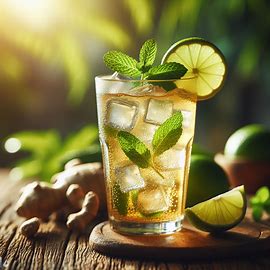
Ginger beer is a fermented drink known for its distinctive spicy flavor, achieved through the fermentation of ginger, sugar, and a culture of yeast and bacteria. This process results in a carbonated beverage with potential probiotic attributes, offering a flavorful option among fermented drinks.
One of the unique characteristics of ginger beer is its effervescent nature, which creates a delightful fizzy sensation with each sip. The use of ginger imparts a refreshing heat and subtle earthy undertones, adding depth to the overall flavor profile. During the fermentation process, the natural sugars in the ginger and added sweeteners are transformed into carbon dioxide, resulting in the drink’s pleasing carbonation.
Due to the presence of live cultures, ginger beer may offer potential probiotic qualities, which can contribute to gut health. While it’s important to note that the probiotic content can vary depending on the preparation method, this aspect adds to the appeal of ginger beer as a beneficial fermented beverage option.
7. Apple Cider Vinegar Drink

Apple cider vinegar drink is a fermented beverage crafted from apple cider, undergoing a multi-step fermentation process to produce acetic acid, enzymes, and probiotics. This tangy, aromatic drink is associated with potential benefits for gut health and digestion.
During the production process, the apple cider undergoes a natural fermentation process in which the sugars are converted into alcohol by yeast and then further fermented by acetic acid bacteria to produce acetic acid. The resulting apple cider vinegar retains its natural enzymes and live probiotics, which can contribute to the promotion of good gut bacteria and support a healthy microbial balance in the digestive system.
Consumption of apple cider vinegar drink is thought to aid in digestive processes, improve nutrient absorption, and assist in maintaining a healthy pH level in the gut. The probiotic content of this beverage plays a role in supporting overall gut health by bolstering the population of beneficial microorganisms in the digestive tract, which is vital for proper digestion and immune function.
8. Lassi
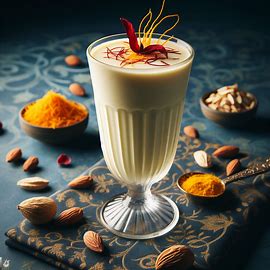
Lassi is a traditional South Asian fermented drink made from blended yogurt, water, and various flavorings, often served as a refreshing beverage.
The fermentation process of yogurt creates beneficial bacteria called probiotics, which are known to support gut health and aid in digestion. Regular consumption of lassi can contribute to a balanced gut microbiome, potentially reducing the symptoms of digestive issues and promoting overall well-being. The addition of flavorings and spices such as cardamom, saffron, or mango not only enhances the taste but also adds their own nutritional benefits to the drink.
How to Make Your Own Fermented Drinks at Home?
.jpg)
Making your own fermented drinks at home can be a rewarding and relatively simple process, requiring essential ingredients such as tea, sugar, kefir grains, or fruit, along with the necessary equipment for fermentation. By carefully following the steps, you can create probiotic-rich beverages in the comfort of your kitchen.
First, select your preferred fermented drink, whether it’s kombucha, kefir, or ginger beer.
Then, gather quality ingredients and equipment, ensuring that you have a clean brewing vessel, a breathable cover, and a pH tester if necessary.
Next, prepare the tea, dissolve the sugar, add the starter culture, and let it cool before transferring it to the brewing vessel.
Once transferred, cover the vessel and let it ferment at the right temperature for the specified duration. Watch the process and taste the drink occasionally to determine when it reaches the desired flavor and level of carbonation.
Once the fermentation is complete, store the drink in suitable bottles, allowing for secondary fermentation if desired.
What Are the Necessary Ingredients and Equipment?
To prepare fermented drinks at home, you will need basic ingredients such as sugar, tea, or fruit, along with specific cultures or grains for fermentation, such as kefir grains or SCOBY. Essential equipment includes glass containers, strainers, and storage bottles to facilitate the fermentation process effectively.
Regarding the ingredients, sugar serves as the food source for the probiotic bacteria and yeast, essential for fermentation, while tea or fruit adds flavor and nutrients.
Cultures like kefir grains, or SCOBY, are the powerhouse behind the fermentation process, colonizing the mixture and kick-starting the transformation into a probiotic-rich elixir. As for the equipment, glass containers provide an ideal environment for fermentation, allowing oxygen to flow while preventing contamination. Strainers aid in separating the fermented liquid from the grains or chunks, and storage bottles complete the process, allowing you to enjoy your homemade probiotic-rich beverages at your convenience.
What Are the Steps to Making Fermented Drinks?
The process of making fermented drinks at home involves several key steps, including preparing the base liquid, adding the cultures or grains, and allowing the mixture to ferment at an optimal temperature. Throughout the fermentation period, periodic monitoring and testing ensure the development of probiotics and the desired flavor profile.
Once the base liquid, such as tea for kombucha or fruit juice for fermented drinks like water kefir, is prepared, it is essential to introduce the cultures or grains. These can include probiotic cultures like Lactobacillus or yeast cultures for alcoholic fermentation.
After adding the cultures, the mixture is left to ferment, typically for several days or even weeks. During this stage, the probiotic organisms multiply, transforming the base liquid into a refreshing, fermented beverage with a tangy flavor and beneficial microorganisms.
Are There Any Risks or Side Effects of Drinking Fermented Drinks?
While fermented drinks are generally well-tolerated, there are potential risks and side effects associated with excessive consumption, particularly for individuals with compromised immune systems or specific health conditions. The most common concerns include bacterial contamination, allergic reactions, and digestive discomfort.
Excessive consumption of fermented drinks can lead to an overgrowth of harmful bacteria, increasing the risk of foodborne illnesses such as botulism or E. coli infection. Individuals with histamine intolerance may experience adverse reactions due to the histamine content in some fermented beverages, leading to symptoms like headaches, skin rashes, or respiratory issues.
It’s important to note that the alcohol content in certain fermented drinks can pose risks for pregnant women and those with liver conditions. Some probiotic-rich fermented beverages may cause bloating or gas in some individuals.
What Are the Precautions to Take When Consuming Fermented Drinks?
When consuming fermented drinks, it is essential to exercise certain precautions, such as moderating the intake, particularly for individuals new to probiotics, and being mindful of any adverse reactions. Ensuring the quality and hygiene of the fermentation process is crucial to minimizing potential risks.
While fermented drinks can provide a range of health benefits, it’s important to approach their consumption with care. Moderation is key, especially for those unaccustomed to probiotics, as sudden intake of large quantities can lead to digestive discomfort. It’s advisable to start with smaller servings and gradually increase as the body adapts. Monitoring for adverse reactions, such as bloating or gastrointestinal issues, is paramount, and immediate medical attention should be sought if severe symptoms occur.
Maintaining hygienic practices during the fermentation process is vital to prevent contamination and ensure the safety of the drink. This includes using clean equipment, proper storage, and attentive monitoring of fermentation times and conditions.
Frequently Asked Questions
What are the benefits of consuming fermented drinks for a healthy gut?
Fermented drinks contain probiotics, which are live bacteria and yeast that are beneficial for improving gut health. They can help balance the good and bad bacteria in the gut, aid in digestion, and boost the immune system.
What are the top 8 must-try fermented drinks for a healthy gut?
The top 8 must-try fermented drinks for a healthy gut include kombucha, kefir, kimchi juice, apple cider vinegar, miso, sauerkraut juice, yogurt, and kvass.
Can fermented drinks help with digestive issues?
Yes, fermented drinks can help with digestive issues such as bloating, constipation, and diarrhea. The probiotics in these drinks can help improve digestion and promote a healthy balance of bacteria in the gut.
Are there any potential side effects of consuming fermented drinks?
While fermented drinks are generally safe for most people, some may experience mild side effects such as bloating or gas. It is important to introduce these drinks slowly into your diet and in small amounts to avoid any discomfort.
How often should I consume fermented drinks for optimal gut health?
It is recommended to consume fermented drinks on a daily basis for optimal gut health. However, start with small amounts and gradually increase as your body adjusts.
Can I make my own fermented drinks at home?
Yes, you can make your own fermented drinks at home using simple ingredients and equipment. However, it is important to follow proper fermentation techniques and ensure that the drinks are properly stored to avoid any harmful bacteria growth.

